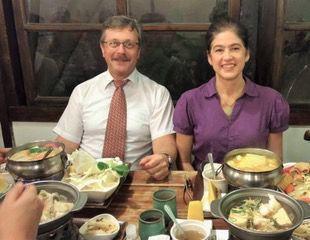
A transition toolbox, for when you look like a local but do not FEEL like a local
By Rita Haudenschild, longtime missionary to Taiwan, now in Europe — Transition can do all kind of things to your system. Mood swings, excitement, disorientation, depressing thoughts, culture stress, loneliness, lack of social network, boredom, helplessness, lots of time to think on your own, getting lost in opportunities (in the theater of your mind), fleeing into the soap opera on TV, tiredness, sleeplessness, lack of focus … all of those—and please go ahead and add your own.
You think I wrote this out of a textbook? Ha! No, I have been experiencing all of these at times myself since we relocated to Europe after 25 years in Taiwan.
Do you remember any time in your adult life when you have been put in a place where you did not know anyone and anything? Is it suddenly hard to find friends you can call on and talk to without having made an appointment a couple of weeks ahead? Is it difficult to get to know some people who seem open for a new friendship? Do you lack the knowledge of the language spoken around you in order to establish deep friendships?

Transitioning to Europe is not like transitioning to Asia, where I look different and people are interested in the foreign, white, “beautiful” face. I do not stand out here. I do look like a local; I can speak the local dialect. But I do not feel like a local; I do not belong here. I do not feel this is my heart language.
Luckily I am an optimist by nature. Or should I rather say, God has been so good to me that I have a sense of looking at things from the positive side. As the fifth child in my family, I was told frequently that I was not planned—I was a surprise! My answer to that, rather than making me feel depressed, instantly sprang out from the bottom of my heart: “How fortunate! You are so lucky to have me now!!!” The world is richer to have me in it. That’s what God thinks of all of us, right?
But when you get into a depressed mode, this conviction seems far away. You sit in the room alone, nobody around you to cheer you up or converse with. The question is: How will I cheer myself up with not knowing a soul around me? Yes, I can chat with God … and everybody who is available on an app in the appropriate time zone.
Then, I get out my toolbox for “What to do in culture stress?” I’m struggling through this transition, even though I have been caring for and coaching newcomers and people in culture stress for more than 20 years . I am glad that I have this toolbox of experiences and helpful ideas for coping. One by one, I:
- Check out some interesting sights in the area
- Get to know my surroundings
- Walk, look, observe
- Go shopping (until price shock hits me)
- Invite someone for dinner at the next Sunday service
- Plan something that will cheer me up like an outing or a concert
- Listen to music, sing, play an instrument
- Read some books
- Laugh, laugh, and laugh some more, about myself
- Journal
- Find someone to talk to
One of the most important tools in the transition toolbox is to
find someone to talk to , who will walk with you through this part of your journey. Someone who will take time and listen. Someone who is willing to share some of your joys and heartaches. Someone who seems to know what you are talking about. I encourage anyone in transition to find this someone, who can help you remember that you are important and have always been wanted by the great “I AM.”
Additional Posts





